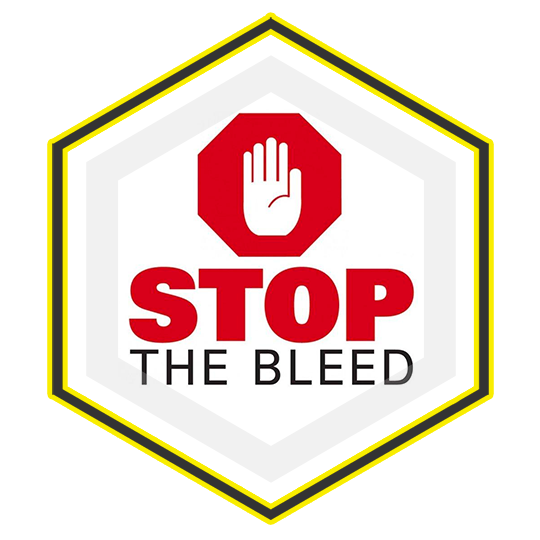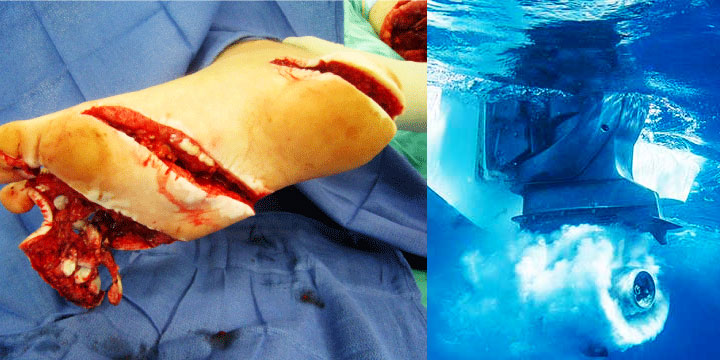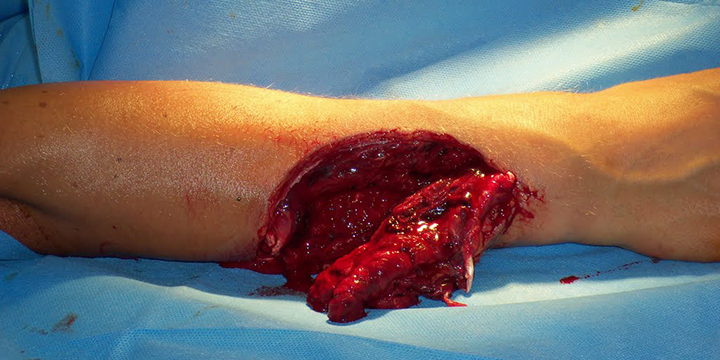
STOP THE BLEED. SAVE A LIFE.
Dive Mentor provides ‘Stop the Bleed’ courses to Scuba Divers and Dive Professionals at no cost so they can learn to provide immediate, frontline aid until first responders are able to take over the care of an injured person. These skills are of particularly importance in dealing with shark bites and propeller strikes.
WHY IT MATTERS
If you’ve never seen diving injuries, then it’s not surprising that you’d wonder why a course like this even matters. But for those who’ve been bitten by sharks or experienced a prop strike, they know all to well how critical it is to get help from people trained to immediately provide help.


FREQUENTLY ASKED QUESTIONS (FAQs)
Here are some basic FAQs related to our BCon class and Stop The Bleed.
The ‘Stop the Bleed’ campaign was initiated by a federal interagency workgroup convened by the National Security Council Staff at the The White House in the United States. The purpose of the campaign is to build national resilience by better preparing the public to save lives by raising awareness of basic actions to stop life threatening bleeding following everyday emergencies and man-made and natural disasters. Advances made by military medicine and research in hemorrhage control during the wars in Afghanistan and Iraq have informed the work of this initiative which exemplifies translation of knowledge back to the homeland to the benefit of the general public.
Because these meetings initiated in Hartford, CT, the Joint Committee’s recommendations became known as the “Hartford Consensus.” One of the recommendations of the Hartford Consensus was to turn bystanders into immediate responders at the scene of wounding before first responders arrived. This step would improve the survivability of victims with severe bleeding. As soon as the area became safe, these immediate responders could act to stop bleeding if they were properly trained in the bleeding control techniques.
That recommendation gained widespread recognition in October 2015 when Stop the Bleed, a national awareness campaign and a call to action, was launched at the White House. Stop the Bleed is intended to cultivate grassroots efforts that encourage bystanders to become trained, equipped, and empowered to help in a bleeding emergency before professional help arrives.
Today, the ACS Committee on Trauma (COT) is leading the effort to save lives by teaching the civilian population to provide vital initial response to stop uncontrolled bleeding in emergency situations. This effort is being accomplished by the development of a comprehensive and sustainable bleeding control educational and informational program targeted to civilians that will inform, educate, and empower the more than 300 million citizens of the United States. The BleedingControl.org website provides instructors and the public with training and materials free of charge.
Studies have shown that the help given by an immediate responder can often make the difference between life and death, even before professional rescuers arrive. The Bleeding Control Basic Course provides participants with the necessary tools to become empowered immediate responders.
It is a maximum 90-minute course including a formal presentation and hands-on practice of direct pressure application, wound packing, and use of a tourniquet. The course was developed for a nonmedical audience to address the needs of the immediate responder to control life-threatening bleeding until help arrives
You can contact us for available classes, or visit the Find a Class search tool at BleedingControl.org and use the contact information included in each class listing to reach out to your local, approved instructors. Our senior Instructor Trainer James L. Clark heads our BCon program. If you don’t see any classes scheduled near you, reach out to us and we may be able to arrange a local course to be taught in your community.
Bleeding control classes do not automatically qualify for continuing education credits. However, you can apply on your own behalf.
No. You need to participate in the class so you can learn the techniques required and then demonstrate that knowledge to your instructor.
While diving is a relatively low risk sport, we still find ourselves in environments where there are inherent risks. Two of the most common that would result in trauma are shark bites and propeller strikes. Knowing how to stop bleeding is exceedingly important in such cases. The BCon course will help you better understand the necessary skills required to help save a life.
Approximately 185 to 265 propeller strike accidents are reported to the U.S. Coast Guard annually. That’s just in the United States, and does not account for scores more in other countries every year.
In 2018, there were 101 verified shark attacks worldwide. It’s not a lot, but if it happens to you or a friend you’ll want to know how to deal with the bleeding.
LOOKING FOR A CAREER IN DIVING?
Dive Mentor’s core mission is fulfilled by helping new divers become professionals in the industry. If you’ve always wanted to become a Dive Guide, Divemaster, or Scuba Instructor our comprehensive vocational programs are exactly what you’ve been looking for.